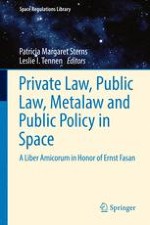2016 | OriginalPaper | Buchkapitel
Legal Issues in China’s Future Participation in the Space Protocol to the Cape Town Convention
verfasst von : Yun Zhao
Erschienen in: Private Law, Public Law, Metalaw and Public Policy in Space
Aktivieren Sie unsere intelligente Suche, um passende Fachinhalte oder Patente zu finden.
Wählen Sie Textabschnitte aus um mit Künstlicher Intelligenz passenden Patente zu finden. powered by
Markieren Sie Textabschnitte, um KI-gestützt weitere passende Inhalte zu finden. powered by
